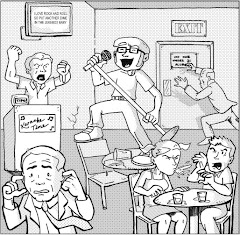The Damned #1, October 2006, Oni Press
writer: Cullen Bunn
artist/letterer: Brian Hurtt
editor: Randal C. Jarrell
[Blogger’s Note: I have two regular on-ramps to the Information Superhighway: a fancy T1 connection at work, and a 19th century dial-up at home. As much as I’d like to post from work daily, my nine-to-five (which starts earlier than nine and ends later than five) offers little time to type a comprehensive review, so I usually write the analysis as a word doc and paste it into A Comic A Day at home. This time, it didn’t work. I saved the essay to a disk and rushed to work, for naught, as 3 ½ inch floppies are as compatible with the modern computer as Whitney is to Bobby nowadays. So, here we go again, because I won’t sleep soundly knowing this thread – pardon the Internet pun – is dangling. The first, hasty review was decent, but here is the essay in its original entirety. Next time, I’ll post it via smoke signal. Watch the skies.]
Before Mel Gibson was getting you-know-what-faced and blaming the Jews for all the wars in the world, he was painting his face blue and proclaiming, “Every man dies, but not every man lives,” a declaration that has become as timeless as making fun of celebrities and their haphazard vices. The Damned has put Braveheart’s battle cry to the test, with a hero that certainly dies, but indefinitely comes back to life. Even if he lives a futile existence, he gets more than a few chances to do it right. That’s a few more than the rest of us, eh?
Fortunately, the way I read The Damned, Eddie isn’t living a futile life, just an odd one. This issue, fresh off the new release rack with a nice aura for my Halloween-themed review, passed my flip test; as I may have described before, with any new issue I contemplate buying, I usually read the first page, flip through the meat of the book to assure that the artwork is consistent, then I read the last page, to analyze if the plot ends poignantly enough to capture me. So, ironically, The Damned wasn’t. The illustration isn’t remarkable, but the style, brushed with gray tone and lettered with what I can only describe as Tim Sale’s gothic font, compliments the supernatural tones of the story, and Eddie’s visible scars act as a distinguishing trait that keeps him recognizable in the thick of the other black-haired Caucasians throughout the rest of the issue. Yes, in a comic also rife with demons, I’m thinking some diversity would’ve helped. Maybe affirmative action doesn’t affect the underworld.
Regarding the issue’s story, Eddie’s gift (curse?) to rise from the dead has placed him at the beck and call of the godfather (devil-father?) Big Al, who hires the resurrection man to find a demon bookkeeper who was assigned to broker a peace deal between two warring hellish mobs. Despite Eddie’s supernatural ties, this issue is hardly scary, and in fact our undead hero’s struggle with his death(s) is surprisingly human, played with a melodrama befitting a mob story. His first moves post-assignment is to track down his love interest and her boyfriend, his killer. A dream featuring a ghost-like demon hungering for his soul is another sobering reminder of Eddie’s condition – as much as we’d like to cheat death, the hurdle would come with its fair share of spiritual and psychological baggage. In this case, Eddie is literally damned if he does and damned if he doesn’t. His last line, the one that sealed the deal for me with this series, sums it up best, “Ain’t that always the way? Lucky to be alive. Better off dead.” Well put.
Since I saw The Departed this weekend, another cops and robbers drama, I can’t help but draw some comparisons between these two stories and to the general themes dominating comics altogether. In The Departed (which I’m sure I’ll review in my LiveJournal in due time), an undercover cop and a mobster’s surrogate son infiltrating the police department struggle with the duality of their missions, enjoying the respective benefits of their positions while crushed by the responsibilities instilled by their masters and respective upbringing. Eddie’s predicament is fairly similar; imagine trying to live a meaningful life with the thought that you were already, and might as well still be, dead. What you are versus what you should be, that kind of thing. Comics revel in the duality of their protagonists, from the secret identities of superheroes to the smoldering bravado versus self-imposed humility of indie/autobiographical books. Some stories end to the hero’s benefit, achieving a balance that harmonizes the internal struggle with the external circumstances of his life. Based on this comic’s pessimistic title, I assume things won’t end well with Eddie. Oddly, and technically, things have ended badly for him already.
One of the movie previews before The Departed impressed a similar theme to Braveheart’s inspirational statement, asking (and I paraphrase), “I want to help change things so when my children speak of their father they can say that I tried to make things right. What will your children say about you?” When we talk about life and death, we’re really discussing the concept of legacy. In The Damned, the idea subtlety lingers, particularly in the context of spiritual consequence. At the end of the day, do you want be among the fortunate . . . or the damned? Eddie embodies the quandary, but you don’t need a comic to tell you, it’s an easy answer.
Monday, October 23, 2006
Subscribe to:
Post Comments (Atom)



No comments:
Post a Comment